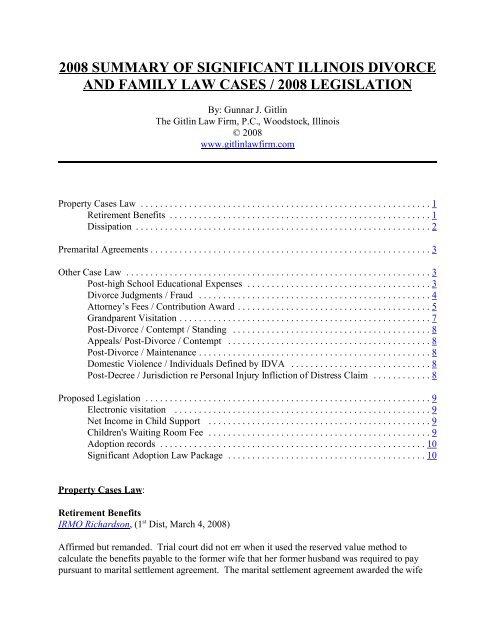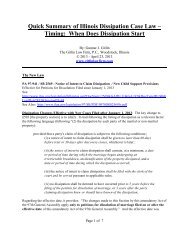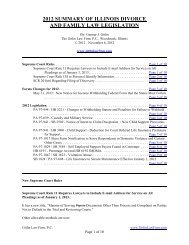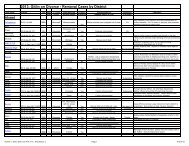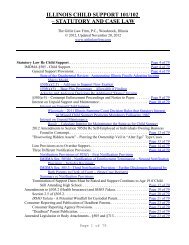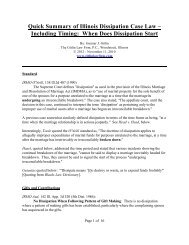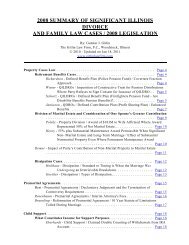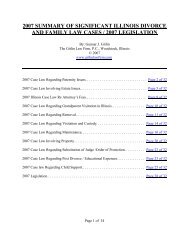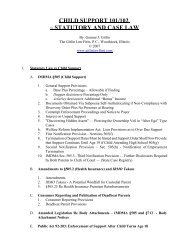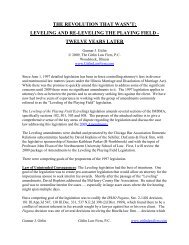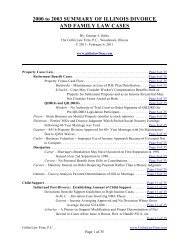2008 summary of significant illinois divorce and family law cases ...
2008 summary of significant illinois divorce and family law cases ...
2008 summary of significant illinois divorce and family law cases ...
Create successful ePaper yourself
Turn your PDF publications into a flip-book with our unique Google optimized e-Paper software.
<strong>2008</strong> SUMMARY OF SIGNIFICANT ILLINOIS DIVORCEAND FAMILY LAW CASES / <strong>2008</strong> LEGISLATIONBy: Gunnar J. GitlinThe Gitlin Law Firm, P.C., Woodstock, Illinois© <strong>2008</strong>www.gitlin<strong>law</strong>firm.comProperty Cases Law ............................................................1Retirement Benefits ......................................................1Dissipation .............................................................2Premarital Agreements ..........................................................3Other Case Law ...............................................................3Post-high School Educational Expenses ......................................3Divorce Judgments / Fraud ................................................4Attorney’s Fees / Contribution Award ........................................5Gr<strong>and</strong>parent Visitation ....................................................7Post-Divorce / Contempt / St<strong>and</strong>ing .........................................8Appeals/ Post-Divorce / Contempt ..........................................8Post-Divorce / Maintenance ................................................8Domestic Violence / Individuals Defined by IDVA .............................8Post-Decree / Jurisdiction re Personal Injury Infliction <strong>of</strong> Distress Claim ............8Proposed Legislation ...........................................................9Electronic visitation .....................................................9Net Income in Child Support ..............................................9Children's Waiting Room Fee ..............................................9Adoption records .......................................................10Significant Adoption Law Package .........................................10Property Cases Law:Retirement BenefitsIRMO Richardson, (1 st Dist, March 4, <strong>2008</strong>)Affirmed but rem<strong>and</strong>ed. Trial court did not err when it used the reserved value method tocalculate the benefits payable to the former wife that her former husb<strong>and</strong> was required to paypursuant to marital settlement agreement. The marital settlement agreement awarded the wife
one half <strong>of</strong> his pension 'as it has accrued' during marriage. Since husb<strong>and</strong>, who is participant indefined benefit plan, remained at his employment long enough to become fully vested, his formerwife is entitled to received one half <strong>of</strong> monthly pension times the number <strong>of</strong> years the partieswere married <strong>and</strong> divided by the total number <strong>of</strong> years that the husb<strong>and</strong> participated in the plan.QDROs / Enhanced BenefitsIRMO Jamieson, (1 st Dist, February 6, <strong>2008</strong>)The QDRO entered by trial court did not violate either the terms <strong>of</strong> the marital settlementagreement entered into between the husb<strong>and</strong> <strong>and</strong> wife or ERISA by providing that wife would beentitled to receive a percentage <strong>of</strong> increase in plan between the last plan valuation date <strong>and</strong> theend <strong>of</strong> new valuation year. Even though QDRO awarded the wife benefits that were contingenton husb<strong>and</strong>'s continuous employment as <strong>of</strong> date <strong>of</strong> entry <strong>of</strong> MARITAL SETTLEMENTAGREEMENT, it was no longer contingent at time <strong>of</strong> entry <strong>of</strong> QDRO.DissipationIRMO Goettler, No. 4-07-0091 (4 th Dist., January 23, <strong>2008</strong>)Reversed <strong>and</strong> rem<strong>and</strong>ed. The trial court erred when it found that both parties dissipated assetswithout stating any basis for its finding regarding the wife, <strong>and</strong> when it failed to considerhusb<strong>and</strong>'s dissipation <strong>of</strong> specific assets in its division <strong>of</strong> property. Regarding dissipation theappellate court reasoned that the following items were dissipation: church contributions <strong>of</strong>$7,700, cashing in $26,000 in a German life-insurance policy after the separation to pay a "loan"from a "colleague", the amount <strong>of</strong> $6,000 which was not accounted for from a 2002 tax refund,<strong>and</strong> the reduction in the Husb<strong>and</strong>’s 401(k) from $82,938.46 to $52,695.53 due to various loans.Regarding these issues, the appellate court ruled that the husb<strong>and</strong> did not maintain his burden <strong>of</strong>showing “clear <strong>and</strong> specific” evidence that the funds from were used for legitimate <strong>family</strong>expenses. Therefore, the trial court's failure to specifically find dissipation regarding these assetswas against the manifest weight <strong>of</strong> the evidence. Additionally, the appellate court found that the$7,700 church contribution was correctly ruled to be dissipation. The appellate court held thatthe vague finding by the trial court that both parties dissipated assets was insufficient. Further,the Goettler court held that the trial court improperly based its calculation <strong>of</strong> the equity in themarital home on the mortgage balance at the time <strong>of</strong> the parties' separation rather than the time <strong>of</strong>hearing since the st<strong>and</strong>ard per §503(f) is that the court, “"shall value the property as <strong>of</strong> the date<strong>of</strong> trial or some other date as close to the date <strong>of</strong> trial as is practicable."On rem<strong>and</strong>, the court should also reevaluate its maintenance <strong>and</strong> attorney's fees awardsconsidering its revised property division.Marital Settlement Agreements / Life Insurance / Constructive TrustsIn re Estate <strong>of</strong> Trevino, No. 2-07-0503 (2 nd Dist., April 7, <strong>2008</strong>) Winnebago CountyThe ex-wife’s life insurance policy, which was benefit <strong>of</strong> her employment, was governed byprovision in marital settlement agreement which required both parties to "maintain the children<strong>of</strong> the parties as the beneficiaries <strong>of</strong> any <strong>and</strong> all retirement plan[s], pension plans, <strong>and</strong> deathbenefits." Therefore, after her death, the probate court correctly interpreted MSA when itimposed a constructive trust on proceeds <strong>of</strong> policy in favor <strong>of</strong> the guardian <strong>of</strong> parties' children,
even though former husb<strong>and</strong> remained listed as the beneficiary.Premarital Agreements:IRMO Best (March 20, <strong>2008</strong>) Illinois Supreme Court.Premarital Agreements / Declaratory JudgmentsReversed in part, affirmed in part, rem<strong>and</strong>ed. The appellate court erred when it held that thecount <strong>of</strong> husb<strong>and</strong>'s complaint seeking declaratory judgment regarding the validity <strong>and</strong>interpretation <strong>of</strong> the parties' premarital agreement did not satisfy requirement that declaratoryjudgment terminate some part <strong>of</strong> litigation between parties. However, it did correctly concludethat provision in agreement prohibiting spousal support award when parties have 'separated' isambiguous; <strong>and</strong>, construed it to bar spousal award only when legal separation has been entered.Therefore, it properly refused to vacate temporary order requiring the husb<strong>and</strong> to reinstate hiswife on his medical insurance policy.Premarital Agreements / Interim Attorney's FeesIRMO Rosenbaum-Golden, (1st Dist., March 6, <strong>2008</strong>) Affirmed. Because interim attorney awardis an advance on the wife's share <strong>of</strong> the marital estate, it does not violate provision in a premaritalagreement restricting claims for fees. Further, the provisions <strong>of</strong> Section 501(c-1) <strong>of</strong> the IMDMAviolates neither contracts clause nor due process clause <strong>of</strong> Constitution. Considering failure onhusb<strong>and</strong>'s part to disclose his income <strong>and</strong> assets, award <strong>of</strong> $150,000 interim fees is not excessive.Reformation <strong>of</strong> Premarital AgreementIRMO Braunling, (2 nd Dist., April 21, <strong>2008</strong>)This case involves two certified questions regarding the parties’ premarital agreement. The<strong>significant</strong> question was:Does the 10-year statute <strong>of</strong> limitations for contract actions, found in section13–206 <strong>of</strong> the Code, bar an action for reformation <strong>of</strong> a premarital agreementbrought more than 10 years after the agreement's execution?Regarding the first question the wife relief on Section 13--206 <strong>of</strong> the Code, whichprovides, in part:"Except as provided in Section 2--725 <strong>of</strong> the 'Uniform Commercial Code', actionson bonds, promissory notes, bills <strong>of</strong> exchange, written leases, written contracts, orother evidences <strong>of</strong> indebtedness in writing, shall be commenced within 10 yearsnext after the cause <strong>of</strong> action accrued[.]" 735 ILCS 5/13--206The appellate court reviewed Section 9 <strong>of</strong> the IUPA which provides that:Any statute <strong>of</strong> limitations applicable to an action asserting a claim for relief undera premarital agreement is tolled during the marriage <strong>of</strong> the parties to the
agreement. However, equitable defenses limiting the time for enforcement,including laches <strong>and</strong> estoppel, are available to either party." (Emphasis added.)The appellate court determined that the statute <strong>of</strong> limitations was tolled per Section 9 during theparties’ marriage. The appellate court stated:The basis for a reformation action is that the parties agreed to reduce to writing amutual underst<strong>and</strong>ing but, in doing so, through either mutual mistake or mistakeon one side coupled with fraud on the other, they omitted some materialprovision. Briarcliffe Lakeside Townhouse Owners Ass'n v. City <strong>of</strong> Wheaton, 170Ill. App. 3d 244, 251 (1988). A reformation action is brought to change thewritten instrument by inserting the omitted provision so that the instrumentconforms to the parties' original agreement. Briarcliffe, 170 Ill. App. 3d at 251."Thus, what is sought to be reformed is not the underst<strong>and</strong>ing between the parties,but rather the written instrument which inaccurately reflects it." (Emphasisomitted.) Briarcliffe, 170 Ill. App. 3d at 251.The appellate court concluded regarding the first question:Having determined that section 9 <strong>of</strong> the Act tolls any statute <strong>of</strong> limitations duringthe parties' marriage, we answer the first certified question in the negative. The10-year limitations period in section 13--206 <strong>of</strong> the Code was tolled during themarriage, <strong>and</strong> Scot's reformation action, which was brought more than 10 yearsafter the premarital agreement's execution, but only one year after the dissolutionproceedings commenced, is not barred by the 10-year limitations period.Other Case Law:IRMO Gulla, (2 nd Dist., May 1, <strong>2008</strong>)In this post-<strong>divorce</strong> case in which the employer was joined as a party Defendant, the employerappealed the trial court’s judgment requiring it to pay $369,000 to the ex-wife as a penalty forknowingly failing to pay, within seven business days, child support from the wages <strong>of</strong> itsemployee, the ex-husb<strong>and</strong>. The appellate court affirmed the trial court’s judgment.In this case subsequent to the children being emancipated there was a substantial supportarrearage. On March 20, 2006, after the ex-husb<strong>and</strong> was employed with Knobias in Mississippi,the trial court entered an order requiring the ex-husb<strong>and</strong> to pay $3,000 per month towards thearrearage. That same day, the trial court issued a notice to Knobias to withhold income forsupport. The employer was served with the notice on March 28, 2006, by certified mail, returnreceipt requested. The notice included the following provisions:Under Illinois <strong>law</strong>, you must begin withholding no later than the next payment <strong>of</strong>income to the employee/obligor that occurs 14 business days after the date <strong>of</strong> thisNotice. You must send the amount withheld to the payee within 7 business days <strong>of</strong>
the pay date. You are entitled to deduct a fee for your actual cost not to exceed$5.00 monthly to defray the cost <strong>of</strong> withholding. The total withheld amount,including your fee, cannot exceed the amount permitted under the FederalConsumer Credit Act. (emphasis in original.)In December 2006, the employer filed a limited response to the petition for a rule to showcause per Section 2-301 <strong>of</strong> the Code asserting that there was no jurisdiction over the employer.Then, In January 3, 2007, Knobias filed a second response to the petition for a rule to showcause, asking that the trial court find that it had acted in good faith to comply with the notice towithhold income. It indicated that the husb<strong>and</strong>’s counsel had informed the employer that theywould file a motion to vacate the trial court’s March 20, 2006 order <strong>and</strong> that the ex-wife’s <strong>law</strong>yerindicated that he did not intend to contest the motion to vacate. It then contented that on April 5,2006, the ex-husb<strong>and</strong>’s Illinois <strong>law</strong>yer notified Knobias that the parties had settled the issue <strong>and</strong>that Stephen would make payments through ExpertPay. Knobias attached the affidavit <strong>of</strong> its inhouse counsel.The appellate court summarized the arguments made by Knobias as:Knobias raises numerous contentions on appeal. Knobias's primary argumentseems to be that, based on the circumstances, it was inequitable to find thatKnobias knowingly failed to withhold the amount designated in theincome-withholding notice. Knobias emphasizes that the notice ordered moremoney to be withheld from Stephen's pay than he was making on a monthly basis.Knobias therefore argues that it was impossible to comply with the trial court'sorder. Upon receiving the notice, Knobias maintains, it reasonably relied onStephen's attorney's representation that the dispute between Suzanne <strong>and</strong> Stephenhad been resolved. Knobias asserts that, immediately upon notification that thematter had not been resolved, income was withheld.The appellate court in rejecting Knobias’ arguments stated:The notice explained that, if the amount to be withheld exceeded the amountallowed by the <strong>law</strong> <strong>of</strong> its state, Knobias should withhold only the amount allowedby its state... Despite this sufficient notice, Knobias failed to withhold any <strong>of</strong>Stephen's income. Although the record reveals that Knobias realized that themaximum amount that it could withhold was 50% <strong>of</strong> Stephen's net income, it didnot withhold that amount until it received notice <strong>of</strong> Suzanne's petition for a rule toshow cause. Furthermore, although the notice directed Knobias to contactSuzanne's attorney if it had any questions regarding the notice, it did not. Based onthe clarity <strong>of</strong> the notice <strong>and</strong> Knobias's failure to adhere to its terms, Knobiascannot rebut the presumption in the Withholding Act that it knowingly failed topay over the amounts that it was obligated to.
Supreme Court Granted Petitions for Leave to Appeal in the Following Case: Civil -Maintenance - Blum v. Koster, No. 105795. Appeal, (2nd Dist. <strong>2008</strong>). This case presentsquestion as to whether trial court properly reduced ex-husb<strong>and</strong>'s maintenance obligation underterms <strong>of</strong> marital settlement agreement <strong>and</strong> made said award unmodifiable in future? Theappellate court had found that the trial court abused its discretion in reducing the maintenanceaward <strong>and</strong> in making any maintenance award unmodifiable. The appellate court also found thatex-wife's petition for attorney fees was timely since imposition <strong>of</strong> section 503(j)'s time limits onaward <strong>of</strong> attorney fees in post-decree proceeding was unwarranted.Post-high School Educational ExpensesIRMO Deike, (4 th Dist., April 3, <strong>2008</strong>)This is a good case to review as to the issues <strong>of</strong> post-high school educational expenses because itis fact sensitive. The parties had agreed that each would pay 50% <strong>of</strong> the college expenses <strong>and</strong> theex-husb<strong>and</strong> filed a petition to modify based upon a substantial change in circumstances. Issuesincluded living expenses during the summer months <strong>and</strong> the ex-husb<strong>and</strong>’s loss <strong>of</strong> his previousjob <strong>and</strong> the bar <strong>and</strong> grill he purchased operating at a loss. The appellate court stated:As for the remaining college expenses, Robert is responsible for one-half as heagreed to be in the marital settlement agreement. He owns a cabin worth $120,000<strong>and</strong> he testified it had a $23,000 mortgage ing the cabin as collateral for his$60,000 to $80,000 "debt-consolidation" loan need not have been believed by thetrial court. He was unable to remember the amount <strong>of</strong> the loan. Robert providedno paperwork regarding either the existence <strong>of</strong> the debt-consolidation-loan or anycollateral for the loan.Robert lost his job at Mitsubishi through no fault <strong>of</strong> his own, but he hadsubstantial severance <strong>and</strong> unemployment benefits <strong>and</strong> was employable. Whenthose ran out, he chose to invest in the bar <strong>and</strong> grill, thereby depleting any reservehe had <strong>and</strong> incurring more debt when he had college-expense obligations forBrennon <strong>and</strong> knew he would likely have those obligations for both daughters inthe near future. He is capable <strong>of</strong> earning in excess <strong>of</strong> $47,000 per year as shownby his net income in 2004 while he is actually in a job paying him $27,000 ingross income.Other findings <strong>of</strong> note stated:The children's contributions to their college expenses are just that <strong>and</strong> Robertshould not be expected to reimburse Marshella if she chooses to reimburse themfor their contributions. Their financial resources are to be taken into account whenconsidering petitions to modify college education expenses.In short, the appellate court affirmed the trial court’s judgment.
Divorce Judgments / FraudNessler v. Nessler, No. 4-07-0220 (4 th Dist., March 14, <strong>2008</strong>)Reversed <strong>and</strong> rem<strong>and</strong>ed. Nessler is an unusual <strong>and</strong> complex case involving, in part, an action formoney damages caused by the ex-husb<strong>and</strong>’s alleged fraudulent inducement <strong>of</strong> her execution <strong>of</strong>the marital settlement agreement. In this case the parties were married, <strong>divorce</strong>, remarried <strong>and</strong>then the remarriage was declared invalid. The ex-husb<strong>and</strong> moved to dismiss the complaint perSection 2-619 <strong>of</strong> the Code <strong>of</strong> Civil Procedure. The appellate court noted the allegation in thecomplaint that the husb<strong>and</strong>, an attorney, induced her to enter into agreement by misrepresentingto her the parties' rights <strong>and</strong> intentions was sufficient to allege fraudulent concealment; <strong>and</strong> tolllimitations period for both 2-1401 motion <strong>and</strong> for fraud. The appellate court noted:Also, we are not convinced that the statute <strong>of</strong> limitations began to run in 1996when the judgment <strong>of</strong> dissolution was entered because the couple remarried in2000 <strong>and</strong> the second marriage was declared invalid in 2004 when the trusts, thesubjects <strong>of</strong> the MSA, were funded for the first time. This leaves open the questionas to what effect the remarriage had on the unfunded MSA <strong>and</strong> what effect thedeclaration <strong>of</strong> invalid marriage has on the then-funded MSA.Regarding the claim <strong>of</strong> fiduciary relationship between the husb<strong>and</strong> (a <strong>law</strong>yer) <strong>and</strong> his wife, theappellate court stated:We note that we are not convinced that a fiduciary duty could not exist accordingto plaintiff's allegations. This is not a case <strong>of</strong> a divorcing husb<strong>and</strong> <strong>and</strong> wife onlevel footing. In this case, defendant husb<strong>and</strong> is an attorney <strong>and</strong> plaintiff wife isnot. Plaintiff alleges defendant advised her regarding Illinois <strong>divorce</strong> <strong>law</strong>s.Defendant clearly knew his wife was not an attorney <strong>and</strong> might have known thatshe would trust his legal advice. While a marital relationship alone may notestablish a fiduciary relationship, a fiduciary relationship may arise in a maritalrelationship as the result <strong>of</strong> special circumstances <strong>of</strong> the couple's relationship,where one spouse places trust in the other so that the latter gains superiority <strong>and</strong>influence over the former.Attorney’s Fees / Contribution AwardIRMO Pond, (2 nd Dist., March 11, <strong>2008</strong>)On the same day that the parties signed the marital settlement agreement, the trial courtentertained the parties' petitions for contribution to attorney fees. The trial court denied bothpetitions. The trial court stated:"The issue <strong>of</strong> contribution is set forth in the attorney's petitions <strong>and</strong> essentiallyrequest the court to, after looking at the division <strong>of</strong> property <strong>and</strong> the relativefinancial circumstances <strong>of</strong> the property [sic] after the division <strong>of</strong> this property ismade <strong>and</strong> any other factors, there being no maintenance, that would be the othermajor consideration, looking at their incomes <strong>and</strong> ability to pay, the Court is going
to deny any relief by [petitioner] in this case. The Court finds that, as I say, at theend <strong>of</strong> the day, the economic circumstances available to [respondent] would not,in this Court's judgment, constitute *** an equitable basis for him to make acontribution towards any attorney's fees that will be paid. So [petitioner's] requestfor contribution to attorney's fees is denied.The appellate court cited Minear in support <strong>of</strong> the proposition that “Inability topay does not require a showing <strong>of</strong> destitution, <strong>and</strong> the party seeking fees is notrequired to divest himself <strong>of</strong> capital assets before requesting fees. It stated,“Rather, a party is unable to pay her fees if the payment would strip her <strong>of</strong> hermeans <strong>of</strong> support or undermine her financial stability. Schneider, 214 Ill. 2d at174. In determining whether <strong>and</strong> in what amount to award attorney fees, the courtshould consider the allocation <strong>of</strong> assets <strong>and</strong> liabilities, maintenance, <strong>and</strong> therelative earning abilities <strong>of</strong> the parties. IRMO Suriano, 324 Ill. App. 3d 839, 852(2001). Regarding earnings, the court may consider both current <strong>and</strong> prospectiveincome. IRMO Selinger, 351 Ill. App. 3d 611, 622 (2004).This case will be analyzed at length because there are very few <strong>cases</strong> which actually reversals <strong>of</strong>a failure to make a contribution award. In fact, the appellate court was able to cite only threeprevious appellate court <strong>cases</strong>, each prior to the “Leveling” amendments.In this case the ex-husb<strong>and</strong> had agreed in the MSA to pay $5,000 toward attorney’s fees whichwas apparently due to violations as to discovery issues. The court then pointed out that the feeaward was not one made per Section 508(b) but per Section 508(a) – incorporating thecontribution provisions by reference. The ex-wife argued that the court could consider a party’sconduct as to the reason for the litigation, citing IRMO Ziemer, 189 Ill. App. 3d 966, 969 (1989).The ex-wife also argued that her ex-husb<strong>and</strong> should be required to contribute toward the $63,000balance <strong>of</strong> fees owed because she had already borrowed $28,000 to pay her attorney, because thehouse which was the majority <strong>of</strong> the estate awarded to her was illiquid <strong>and</strong> because her exhusb<strong>and</strong>could afford to pay via a contribution award payments over time. The ex-husb<strong>and</strong>argued in part that he had over $38,000 in credit card debt he was therefore left with no moneyafter paying the credit card debt. The ex-husb<strong>and</strong> thus argued that while his ex-wife had similardebt (excluding attorney fees), she also has the house. He also urged that the ex-wife had waivedthe argument that he could make installment payments, because she did not <strong>of</strong>fer such a proposalin the trial court. The ex-husb<strong>and</strong>’s further arguments were:On the subject <strong>of</strong> income, respondent points out that petitioner was earning$38,422 in 2005 when she quit her job, <strong>and</strong> he argues that the trial court wasimputing an income to her <strong>of</strong> $25,000 for college contribution purposes only.Respondent maintains that we should not ignore that petitioner quit her job in themiddle <strong>of</strong> the proceedings <strong>and</strong> then asked for contribution based on a lowerimputed income for college purposes. Respondent further argues that petitionerreceived 65% <strong>of</strong> the assets to balance his higher income. According to respondent,petitioner already benefitted from the differences in income but now seeks todouble dip.
The appellate court determined that the ex-wife did not waive the issue <strong>of</strong> seeking payments overtime by now raising it at the trial court level. Because the ex-wife quit her job earning $38,000,the appellate court stated that it was reasonable to consider that her future income would likelyrise. See Selinger, 351 Ill. App. 3d at 622 (court may consider both current <strong>and</strong> prospectiveincome). Regarding the ex-husb<strong>and</strong>’s income, the settlement agreement recited that he earned$93,610 in 2005 <strong>and</strong> had a projected 2006 income <strong>of</strong> $83,000 based upon his October year todate income. The appellate court focused its attention on the <strong>cases</strong> reversing the trial court’sdenial <strong>of</strong> attorney’s fees. IRMO Carpenter, 286 Ill. App. 3d 969 (1997), IRMO Haas, 215 Ill.App. 3d 959 (1991), <strong>and</strong> Sullivan v. Sullivan, 68 Ill. App. 3d 242 (1979).Those <strong>cases</strong> break down as follows as to the income comparison:Case Amt Wife Note Husb<strong>and</strong> NoteSoughtCarpenter $3,543 $12,000 $45,000 Estimated for HHass $5,647 $15,000 Less Than $49,000 Excluding BonusSullivan $4,176 W’s Gross $14,676 Net figure for HApplying the facts, the appellate court stated:Petitioner clearly demonstrated that she is unable to pay her attorney fees withoutinvading her capital assets or undermining her financial stability. Althoughpetitioner received a greater portion <strong>of</strong> the marital assets, they consist largely <strong>of</strong>retirement accounts <strong>and</strong> illiquid assets such as the house. Petitioner also receivedaround two-thirds <strong>of</strong> the liabilities, giving her over $100,000 in debts. These debtsare in addition to petitioner's attorney fee debts <strong>of</strong> over $91,00010 <strong>and</strong> theapproximately $52,000 debt she incurred to pay respondent his share <strong>of</strong> thehome's equity. These circumstances, along with petitioner's limited income, showthat petitioner is unable to pay her attorney fees.We also conclude that petitioner showed that respondent is able to pay at least aportion <strong>of</strong> her attorney fees. While respondent may still have about $20,000 incredit card debt if he applies his remaining equity from the house to theoutst<strong>and</strong>ing credit card balance, this is his only remaining debt, <strong>and</strong> he has nochild support or maintenance obligations. Respondent's income <strong>of</strong> over $83,000is over three times petitioner's imputed income <strong>and</strong> more than twice her previousincome at Dick Pond Shoes. The courts in Carpenter, Haas, <strong>and</strong> Sullivan allemphasized the differences in the parties' incomes in determining that the trialcourts abused their discretion in refusing to order attorney fee contributions.Though respondent argues that petitioner has already benefitted from thedifferences in income by receiving 65% <strong>of</strong> the marital assets, as stated, indetermining whether <strong>and</strong> in what amount to award attorney fees, the court shouldtake into account the allocation <strong>of</strong> assets <strong>and</strong> liabilities, maintenance, <strong>and</strong> theparties' relative earning abilities. Thus in analyzing this issue, we are cognizant <strong>of</strong>petitioner's greater assets. But we also consider that this benefit was diluted by herwaiver <strong>of</strong> maintenance <strong>and</strong> her assumption <strong>of</strong> a much greater share <strong>of</strong> the
liabilities. We agree with respondent that he should not be responsible for theentire remaining balance <strong>of</strong> petitioner's attorney fees. At the same time,considering the nature <strong>of</strong> petitioner's assets, her vast debts, <strong>and</strong> the <strong>significant</strong>income disparities, we believe that the trial court abused its discretion by notordering respondent to contribute to petitioner's attorney fees in any amountbeyond the $5,000 he already paid.Accordingly, the appellate court reversed <strong>and</strong> rem<strong>and</strong>ed the case to the trial court to determinethe contribution award.Gr<strong>and</strong>parent VisitationIn re Gr<strong>and</strong>parent Visitation <strong>of</strong> Pfalzgraf, (5 th Dist., 2/4/08)In Pfalzgraf, the paternal gr<strong>and</strong>parents filed a petition for gr<strong>and</strong>parent visitation per §607 <strong>of</strong> theIMDMA alleging that their son did not object <strong>and</strong> seeking extensive visitation with theirgr<strong>and</strong>daughter.Post-Divorce / Contempt / St<strong>and</strong>ingIRMO Hopwood, No. 5-06-0660 (5 th Dist., January 28, <strong>2008</strong>) Affirmed. The trial court correctlyconcluded that former wife lacked st<strong>and</strong>ing to enforce, through contempt petition, her formerhusb<strong>and</strong>'s failure to pay debt allocated to him in judgment <strong>of</strong> dissolution. Because her father paidthe debt as guarantor in order to preserve his debt, she cannot show an injury to a cognizableinterest.Appeals/ Post-Divorce / ContemptIRMO Schwieger, No. 2-06-1005 (2 nd Dist., January 23, <strong>2008</strong>) Appeal dismissed. The exhusb<strong>and</strong>'sappeal from order finding that he failed to pay his former wife for her share <strong>of</strong>proceeds from sale <strong>of</strong> marital home must be dismissed because order on motion for indirectcriminal contempt <strong>of</strong> court does not impose penalty <strong>and</strong> there remains a second motion to findhusb<strong>and</strong> in indirect criminal contempt still pending.Post-Divorce / MaintenanceIRMO Reynard, No. 4-06-0897 (4 th Dist., January 16, <strong>2008</strong>) Affirmed. The trial court did notabuse its discretion when it refused to increase former wife's maintenance payment after parties'youngest child graduated from college <strong>and</strong> former husb<strong>and</strong> remarried. The trial court properlyweighed evidence <strong>and</strong> concluded that there had been insufficient evidence <strong>of</strong> material change inparties' circumstances because husb<strong>and</strong> incurred loans in order to pay for child's education, hadsubstantial capital improvements expenses as result <strong>of</strong> deferring maintenance to home, <strong>and</strong> hadspouse with her own set <strong>of</strong> expenses. In addition, although the wife lost her tenant, she increasedher investment income.Domestic Violence / Individuals Defined by IDVABenjamin v. McKinnon, No. 4-07-0079 (4 th Dist., February 26, <strong>2008</strong>) Affirmed.A woman was properly granted a plenary order <strong>of</strong> protection against the father <strong>and</strong> brother <strong>of</strong> her<strong>divorce</strong>d son’s ex-wife. The Benjamin v. McKinnon court cited the IDVA’s inclusion <strong>of</strong>
“persons related by...prior marriage” in the definition <strong>of</strong> “<strong>family</strong> or household member.” Thecourt also relied on its stated purpose <strong>of</strong> preventing escalating intra-<strong>family</strong> violence in finding theIDVA protection extended to siblings <strong>and</strong> parents <strong>of</strong> formerly married spouses. In this case, theargument was that these individuals were not “<strong>family</strong> or household members <strong>of</strong> the Plaintiffunder the Act.” The case used terms <strong>of</strong> art <strong>of</strong> direct affinity which is the relationship <strong>of</strong> onespouse to the other spouse’s blood relatives <strong>and</strong> collateral affinity which is the relationship <strong>of</strong> aspouse’s relatives to the other spouse’s blood relatives such as a “wife’s brother <strong>and</strong> herhusb<strong>and</strong>’s sister.” (citing Black’s Law Dictionary.) The opinion found that the defendants wererelatives by collateral affinity seeking support through <strong>and</strong> out-<strong>of</strong>-state case. The dissent urgedthat “there must be some parameters to determine when <strong>and</strong> if people are related by marriage”<strong>and</strong> urged that the statute does not use the term “relatives by collateral affinity.”Post-Decree / Jurisdiction re Personal Injury Infliction <strong>of</strong> Distress ClaimGordon v. Gordon, (3 rd Dist., March 11, <strong>2008</strong>).Affirmed. The trial court correctly concluded that it lacked personal jurisdiction over Floridadefendant, plaintiff's former wife, <strong>and</strong> dismissed the plaintiff's complaint for intentional <strong>and</strong>negligent infliction <strong>of</strong> emotional distress. All <strong>of</strong> the alleged <strong>of</strong>fensive acts related to defendant'sbehavior surrounding a Florida Marital Settlement Agreement incorporated in a Floridajudgment. The only conduct by defendant reaching into Illinois, a call <strong>and</strong> e-mail to Illinois, isinsufficient to require her to defend action in this State under due process.Proposed Legislation: This is not an active legislation session in terms <strong>of</strong> movement on<strong>significant</strong> <strong>family</strong> <strong>law</strong> legislation. It appears that the excuse for bills which have stalled, etc., isthe potential to comprehensively review the Illinois Marriage <strong>and</strong> Dissolution <strong>of</strong> Marriage Act.Nevertheless, in light <strong>of</strong> the length <strong>of</strong> time that it would take to do so properly, it is disappointingto see that some <strong>of</strong> the proposed <strong>family</strong> <strong>law</strong> legislation appears stalled due to this reason.House Joint Resolution 91 (Fritchey, D-Chicago) creates the Illinois Family-Law StudyCommittee. Its mission is to examine the Illinois Marriage <strong>and</strong> Dissolution <strong>of</strong> Marriage Act, <strong>and</strong>study the changes in <strong>law</strong> <strong>and</strong> society.http://www.ilga.gov/legislation/95/HJR/PDF/09500HJ0091lv.pdfAmendment3/12/<strong>2008</strong> House Placed on Calendar Order <strong>of</strong> Resolutions as AmendedSee also:HR1101 (Rep. Michael J. Madigan - John A. Fritchey) Creates the Illinois Family-Law StudyCommittee to examine the Illinois Marriage <strong>and</strong> Dissolution <strong>of</strong> Marriage Act, study the changesin <strong>law</strong> <strong>and</strong> society since the Act was enacted, <strong>and</strong> recommend how the Act should be amended toimprove <strong>and</strong> update it.4/1/<strong>2008</strong> House Referred to Rules Committee4/10/<strong>2008</strong> House Added Chief Co-Sponsor Rep. John A. Fritchey
*Electronic visitation - House Bill 4220 (Munson, R-Elgin) defines 'reasonable visitation' toinclude electronic communication. Allows the court to grant a reasonable amount <strong>of</strong> electroniccommunication at reasonable hours to a parent when the child is not in that parent's physicalcustody. But electronic communication may not replace or substitute for other visitation thenoncustodial parent may receive.http://www.ilga.gov/legislation/95/HB/PDF/09500HB4220lv.pdfStatus: 4/17/<strong>2008</strong> House Third Reading - Short Debate - Passed 114-000-0004/23/<strong>2008</strong> Senate Referred to Rule*Net Income in Child Support - House Bill 5771 (Franks, D-Marengo) changes thecomputation <strong>of</strong> child support. It makes a deduction straight-line depreciation <strong>of</strong> capital assetsreasonable <strong>and</strong> necessary for the production <strong>of</strong> income. But no depreciation may be allowed forreal estate.http://www.ilga.gov/legislation/95/HB/PDF/09500HB5771lv.pdfStatus: 3/24/<strong>2008</strong> House House Amendment No. 1 Recommends Be Adopted RulesCommittee; 003-000-0004/18/<strong>2008</strong> House Final Action Deadline Extended-9(b) May 9, <strong>2008</strong>.Net Income in Child Support - House Bill 5727 (Brosnahan, D-Evergreen Park) changes thecomputation <strong>of</strong> child support. It makes a deduction for reasonable educational expenses <strong>of</strong> a child<strong>of</strong> the parties who is enrolled in pre-school, elementary, or secondary educational institution. Toview the full text, see ... http://www.ilga.gov/legislation/95/HB/PDF/09500HB5727lv.pdfStatus: 3/14/<strong>2008</strong> House Rule 19(a) / Re-referred to Rules Committee*Children's Waiting Room Fee - House Bill 4956 (Nekritz, D-Northbrook) increases themaximum fee assessed against civil litigants from $5 to $10 for children's waiting rooms at thecounty board's direction.Status: 4/16/<strong>2008</strong> House Third Reading - Short Debate - Passed 061-053-000; 4/16/<strong>2008</strong> /Senate Placed on Calendar Order <strong>of</strong> First Reading April 17, <strong>2008</strong>4/30/<strong>2008</strong> Senate Referred to Ruleshttp://www.ilga.gov/legislation/95/HB/PDF/09500HB4956lv.pdfEducational Expenses - Senate Bill 2044 (Dillard, R-Downers Grove) entitles each parent toknow the name <strong>of</strong> the education institution that the child attends unless the court finds that thechild's safety would be jeopardized. Status: In rules committee.http://www.ilga.gov/legislation/95/SB/PDF/09500SB2044lv.pdfStatus: 4/1/<strong>2008</strong> Senate Third Reading - Passed; 053-000-0004/30/<strong>2008</strong> House Assigned to Judiciary I - Civil Law CommitteeAdoption records - House Bill 4623 (Feigenholtz, D-Chicago) amends the Adoption Act toallow adults who were adopted to obtain copies <strong>of</strong> their original birth certificates. Adoptees bornbefore Jan. 1, 1946 could get copes <strong>of</strong> their original birth certificate after Jan. 1, 2009. All otheradoptees would have to wait until after April 1, 2009. That three-month period is intended to givebirth parents an opportunity to file a request to keep their identities confidential. On second
eading in the House. Full Text. 4/16/<strong>2008</strong> House Placed on Calendar Order <strong>of</strong> 3rdReading - Short Debate4/18/<strong>2008</strong> House Final Action Deadline Extended-9(b) May 9, <strong>2008</strong>Significant Adoption Law Package - House Bill 4571 (Feigenholtz, D-Chicago) Makes anumber <strong>of</strong> changes to adoption <strong>law</strong>. (1) Clarifies that a prospective-adoptive parent may give agift or gifts to the biological parent if they do not exceed $200 in total. (2) Allows aprospective-adoptive parent to advance a maximum <strong>of</strong> $1,000 for reasonable birth-parentliving-expenses without court approval. But it requires a final accounting <strong>of</strong> all expenses beforeentry <strong>of</strong> a final order. (3) Allows a prospective-adoptive parent to seek reimbursement <strong>of</strong>reasonable-living expenses from a person who receives these payments for another person whohe or she knows not to be pregnant or who receives payments simultaneously from more than oneprospective adoptive-parent. (4) Requires court approval if the reasonable attorney fees <strong>of</strong> thebiological parent (to be paid by the prospective-adoptive parents) are more than $1,000. Requiresthat all fees be included in the final accounting. (5) Exp<strong>and</strong>s access by the confidentialintermediary to vital records maintained by another state's vital records' depository. (6) Clarifiesany non-identifying information learned during the confidential intermediary's search may begiven to the petitioner at any time during the search before the case is closed. (7) Allows aconfidential intermediary to provide to an eligible petitioner with information about (a) the name<strong>and</strong> contact information <strong>of</strong> the agency that had legal custody <strong>of</strong> or responsibility for thesurrendered person <strong>and</strong> (b) the name <strong>of</strong> the state in which the surrender or the adoption occurred.http://www.ilga.gov/legislation/95/HB/PDF/09500HB4571ham001.pdfLast Action: 4/2/<strong>2008</strong> House Placed on Calendar Order <strong>of</strong> 3rd Reading - Short Debate4/18/<strong>2008</strong> House Final Action Deadline Extended-9(b) May 9, <strong>2008</strong>The Gitlin Law Firm, P.C., provides the above information as a service to other <strong>law</strong>yers. Aperson's accessing the information contained in this web site, is not considered as retaining TheGitlin Law Firm for any case nor is it considered as providing legal advice. The Gitlin Law Firmcannot guarantee the outcome <strong>of</strong> any case.The Gitlin Law Firm, P.C.663 East Calhoun StreetWoodstock, IL 60098815-338-9401815-338-9403Last Updated: May 5, <strong>2008</strong>G:\DOCS\Case Law Update <strong>2008</strong>.wpd


